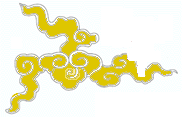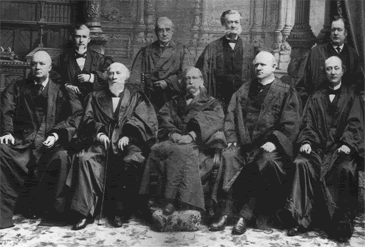
 |
|
Introduction
| Anti-Chinese
Laws |
Wong
Kim Ark's Case
| Legal
Issues Today |
Works Consulted
|
|
|
The longest amendment to the US Constitution, the fourteenth amendment was passed by Congress one year after the conclusion of the Civil War as a way of protecting the rights of newly freed African-American Slaves. Section 1 of the amendment protects all United States residents against state laws by prohibiting state governments from denying persons within their jurisdiction the "privileges and immunities" of US citizenship. States may not restrict the rights of people within their boundaries. The amendment defined citizenship as a way to protect citizens from the states. The amendment originally focused on the civil status of newly freed slaves, overruling Dred Scott v Sandford, which concluded that African-Americans were not federal citizens. |
|
Wong Kim Ark in 1894
|
|
|
Signature of Wong Kim Ark, testifying that he is a citizen of the United States. Click here for full text
|
The Supreme Court in 1894 Reproduced in Yarbrough, Tinsley E. Judicial Enigma: The First Justice Harlan. New York: Oxford University Press, 1995. |
|
Arguments in support of the appellee, Wong Kim Ark"He
has always subjected himself to the "Prejudice
of race and pretension of caste were |
Arguments
in support of the appellant, the United States
"Large
numbers of Chinese laborers of a distinct race and religion, remaining
strangers in the land, residing apart by themselves...and apparently incapable
of assimilating with our people, might endanger good order and be injurious
to the public interests." "As
the respondent was born of alien parents, to wit, subjects of the Emperor
of China, he was at his birth a subject of China, claimed by that nation
as such, and therefore was not born "subject to the jursidiction"
of the United States."
|
|
|
"The
question at issue is not one that affects American-born Chinese only,
but every American-born son of a foreign-born father who did not become
a naturalized citizen of this country prior to the time arrived at maturity.
In this view of the case one sees at a glance that many thousands of voters
all over the United States are deeply interested in the knotty legal problem,
though of course should the United States Supreme Court reverse the ruling
of Judge Morrow, as it is confidently expected that it will, the American-born
Chinese will be the only ones ultimately deprived of citizenship. Sons
of non-naturalized Caucasians will merely have to secure naturalization
in the ordinary way. But the Mongolians, while the existing Chinese restriction
laws are in force, will be forever barred from citizenship." |
All
Persons Born...
combines
web based and physical exhibits. It was produced by the
UC
Hastings College of the Law Library,
4th Floor, 200 McAllister Street, San Francisco.
Research and text by Chuck Marcus, Reference Librarian. Research and web design by Beret Aune and Katie Wadell, Library Assistants.